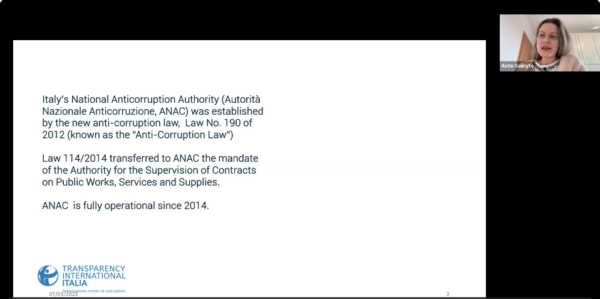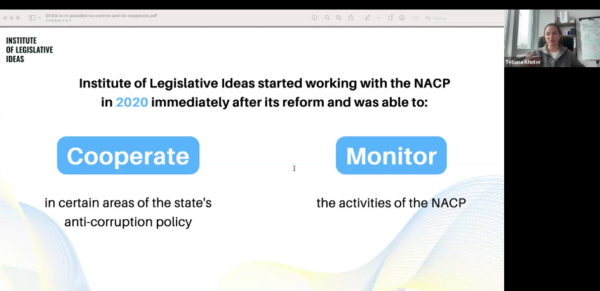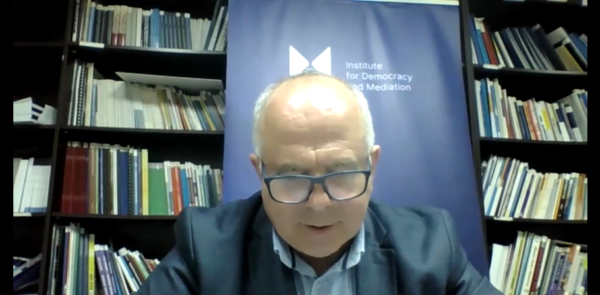18 March 2024 –
Most countries in Europe have established anti-corruption agencies and authorities as a key pillar of their national integrity frameworks. As corruption is a multifaceted phenomenon, the importance of such agencies has steadily increased, with mandates to address corruption through prevention and/or through investigation. In the first regional meeting of the year of the UNCAC Coalition’s Europe network on 7 March, we looked at how civil society organizations can and do engage with anti-corruption agencies. Participants exchanged experiences of advocacy, collaboration and monitoring in different contexts.
Independent bodies to prevent and to prosecute corruption
The French Anti-Corruption Agency defines anti-corruption agencies as “public bodies with a specific mandate to combat and prevent corruption”. Given the multiplicity of structures and mandates, categorizing them remains a challenge. However, their aim is generally to tackle corruption through a combination of activities from prevention, education, and investigation to prosecution. Many are involved in developing national anti-corruption strategies, and some are in charge of managing asset and interest declarations’ systems.
While there are different types of bodies, operational independence is a commonly agreed upon necessary feature for anti-corruption agencies and authorities to be effective. The United Nations Convention against corruption (UNCAC) demands in Article 6 that States Parties establish a body or bodies to carry out preventive functions, such as coordinating policies and disseminating knowledge. Furthermore, Article 36 requires that they establish “a body or bodies or persons specialized in combating corruption through law enforcement”, and that these entities should be granted necessary independence. In 2019, the 8th UNCAC Conference of the States Parties (CoSP) adopted resolution 8/7 on ‘Enhancing the effectiveness of anti-corruption bodies in fighting corruption’, highlighting that “national anti-corruption agencies and agencies with anti-corruption responsibilities” require adequate resources. Likewise, the Council of Europe’s Criminal Law Convention on Corruption recognizes in Article 20 the usefulness of domestic entities dedicated to addressing corruption and calls on its members for the creation of specialized authorities with necessary independence.
In Europe, there are two main models that coexist: the single agency and the multipurpose agency. Countries in Eastern Europe and the Balkans created anti-corruption agencies or commissions as part of their political transition and EU accession process, while Western European countries mostly opted to integrate relevant functions into their existing law enforcement authorities – with notable exceptions including Italy or France. Today, according to recent mappings, about half of the countries in Europe have a single, independent anti-corruption agency while others rely on departments under the police or the general prosecutor’s office. The European Partner Against Corruption (EPAC) and the European contact-point network against corruption (EACN), bringing together anti-corruption and police oversight practitioners from Council of Europe and European Union Member States, published in 2012 the Anti-Corruption Authority Standards and Police Oversight Principles to promote transparent, independent and sustainable anti-corruption bodies as called for by Articles 6 and 36 of the UNCAC.
The Regional Anti-corruption Initiative (RAI) and the United Nations Office on Drugs and Crime (UNODC) jointly conducted from 2016 to 2020 the “Southeast Europe Regional Programme on Strengthening the Capacity of Anti-corruption Authorities and Civil Society to Combat Corruption and Contribute to the UNCAC Review Process”. One of the conclusions of the programme was that “anti-corruption agencies or UNCAC focal points often are hampered by lack of capacity, resources, training and time to fully engage with civil society”.
Cooperation between ANAC and Transparency International Italy
Anti-corruption agencies and authorities engage with civil society to varying degrees and in different ways. Depending on the mandate and context in which they operate, there are different levels of cooperation. In the case of Italy, the mandate and scope of the Italian National Anticorruption Agency (ANAC) is very broad. Aistė Galinytė, Project Officer at Transparency International Italy (TI Italy), presented a good example of collaboration with an agency that covers all the ground between prevention to sanctioning.

ANAC was established in 2012 with the mandate to deal with prevention of corruption and illegal behaviors in the public sector, and became fully functional in 2014, with the extended responsibility of monitoring public procurement contracts. It is financially and politically independent, led by a collective body of five members, and ANAC’s President is appointed by the Minister of Public Administration with broad consensus among other ministries for a non-renewable mandate of six years while elections to the Parliament are held every five years. ANAC is financed through compulsory contributions paid by contracting authorities and economic operators taking part in public procurement processes, and has authority over public officials and public authorities, reporting annually to the Italian Parliament on its activities independently from all other government bodies.
The main areas of ANAC’s competence are public procurement, transparency, and corruption prevention, to which whistleblowing was recently added. In the area of public procurement, ANAC’s mandate covers a broad range of powers from regulatory, supervisory, advisory, monitoring, and inspecting to sanctioning powers. It adopts public procurement guidelines and standardized tender documents, issues binding and non-binding opinions, submits proposals for new legislation, monitors public contracts to guarantee their legality, and collects data on public tenders which has resulted in an extensive national public procurement database. Concerning transparency and corruption prevention, ANAC oversees how public entities implement the obligation to proactively disclose information on their websites. It monitors public entities’ anti-corruption strategies, and the appointment of public officials in charge of transparency and the prevention of corruption, with the possibility to sanction entities for non-compliance.
With the transposition of the EU Directive on whistleblowing in Italy, ANAC was designated as the national authority on whistleblowing, covering both the public and the private sector. This is the area in which Transparency International Italy mostly collaborates with the agency. With a 10-year-long track record working on whistleblower protection and assisting potential whistleblowers, TI Italy was well-positioned to provide expert opinions and guidance. ANAC usually invites TI Italy to consultations, hearings and working groups, for instance on the adoption of whistleblowing guidelines, and both entities jointly provide whistleblowing training to other institutions.
The collaboration between TI Italy and ANAC is formally established in a memorandum of understanding, and takes place through informal channels as well. ANAC’s President has attended the annual launch of TI’s landmark Corruption Perception Index for the past four years. Other areas in which TI Italy and ANAC collaborate include civic monitoring of public procurement through integrity pacts, and on healthcare sector transparency. Overall, TI Italy considers the collaboration as a win-win situation for both sides, facilitating TI Italy’s relationship with other public institutions, and giving ANAC an opportunity to better connect with citizens and enhance its social legitimacy.
Ukrainian civil society and the national anti-corruption agency: cooperation and monitoring
In the midst of full-scale invasion of Russia in Ukraine over the past two years, Ukraine has built a solid anti-corruption institutional framework. Tetiana Khutor, Chair of the Institute of Legislative Ideas (ILI) explained this framework and how her organization interacts with it.
In Ukraine, the anti-corruption infrastructure consists of several agencies: the National Agency on Corruption Prevention (NACP) with preventative functions, the National Anti-Corruption Bureau (NABU) carrying out investigations, the Specialized Anti-Corruption Prosecutor’s Office (SAPO) and the High Anti-Corruption Court (HACC). Besides this, the Asset Recovery and Management Agency or ARMA is a special agency dealing with tracing and confiscating assets from corruption and other criminal proceedings.

NACP was established in 2016 to prevent and detect corruption. In 2020 the agency was relaunched, with a head appointed instead of the previous board, and this is when ILI started to work with NACP. Cooperation between ILI and NACP has materialized for instance in the platform to monitor progress with the implementation of the UNCAC’s Chapter II and V, elaborated by ILI and NACP, and presented at the UNCAC CoSP10 in Atlanta, USA, in December 2023. The development of the tool is still in progress, with plans to regularly update it and include an analysis of compliance with Chapters III and IV of the UNCAC and insights on the implementation of the recommendations of the European Commission to Ukraine to combat corruption.
ILI also monitors the NACP. The agency has become one of the strongest authorities and its head has significant powers. NACP is responsible for managing and verifying electronic declarations of public officials, and for the anti-corruption proofing of draft legislation. As foreseen by the law, a public council including nine civil society representatives controls the head of the NACP. Its main tasks are to ensure transparency and public control over NACP activity, contribute to the interaction between NACP and third parties including civil society organizations and businesses, and encourage engagement with citizens. The public council also influences the hiring process and disciplinary commissions in the NACP. Civil society representatives were selected through an open competition in a voting process involving the whole of society, and Tetiana from ILI is a member of the council.
Given the experience of ILI, Tetiana states that it is possible to both cooperate with and monitor an anti-corruption agency. The relation has to entail benefits for the agency as well as for the civil society counterpart. In this case, NACP understands that supporting civil society and involving them in public decision-making processes gives the agency a vital form of protection: in the case of external or political influence of other governmental departments, civil society can provide media support and promote the case among international donors and partners. Further to this, NACP benefits from the expertise of anti-corruption specialists to help develop and implement its activities.
Searching for balance in the fight against corruption in Albania
The last case study of the meeting concerned Albania, where there is no anti-corruption agency. Sotiraq Hroni, Executive Director of the Institute for Democracy and Mediation (IDM), explained how they advocated for an independent agency and why their priorities have changed.
In 2018, IDM developed a paper analyzing the function of the national coordinator against corruption in Albania, which was under the Minister of Justice. The study found that many citizens perceived a conflict of interest in the mission of the coordinator. Based on this research, IDM began advocating for the High Inspectorate for the Declaration and Assessment of Assets and Conflicts of Interest (HIDAACI), which was also responsible for implementing the law on whistleblowers, to be transformed into a multi-purpose anti-corruption agency that would be independent and respond to the Parliament.

Despite the support of other governmental bodies and evidence pointing to the ineffectiveness of HIDAACI in its current set-up, the reform did not take place. However, at the beginning of 2024, a new position was created in the government: the Minister of State for Public Administration and Anti-Corruption. The minister is appointed by the Prime Minister, under the mandate of the current government. IDM welcomed this positive evolution, especially given that the person who has been appointed to this role is supportive and cooperative with civil society.
IDM’s plans have changed and adapted to the new framework: they have paused advocacy for an independent anti-corruption agency and shifted to monitoring the government’s performance, empowering civil society and other institutions to monitor public sector integrity, and developing anti-corruption and ethics curricula. For instance, IDM developed a risk assessment tool for the central and local governments which was adopted as an official tool by the Ministry of Justice, and is now used by every public institution at the local level. IDM has also developed a long-term cooperative relationship with the State Audit Institution and with other governmental departments. However, cooperation is based on the authorities’ need for external expertise, not on a shared vision of considering civil society as partners in the fight against corruption.
Civil society support in a context of political interference
Following the presentations, participants raised questions about the different models of anti-corruption agencies, their effectiveness and their independence.
The Italian ANAC’s broad mandate and responsibilities include monitoring three-year anti-corruption plans elaborated by public entities, and holding the power to sanction those that fail to publish these plans according to the law. With around 300 employees, the agency works closely with officers for the prevention of corruption and transparency, supervises their appointment, collaborates on trainings, and issues guidelines. Whistleblowing remains a large part of their work, as the agency has established its own whistleblowing platform which potential whistleblowers can use as an external reporting channel. On procurement, ANAC closely monitors public tenders and, thanks to the national database, can raise red flags.
Regarding the Ukrainian NACP, Tetiana acknowledged that having one person at the head of the entity instead of a commission implied a greater responsibility in the appointment of that person. However, it is easier to monitor the competition for one position instead of several and, in the case of NACP, it was a transparent process.
These public bodies demonstrate that a cooperative relationship between anti-corruption agencies and civil society can be mutually reinforcing. In challenging situations and/or political interference, civil society can provide strong support, although it is not always sufficient. In Spain, the regional anti-corruption agency of the Balearic Islands was recently closed by the regional government. Several civil society groups saw this as a threat to other existing regional agencies and to the fight against corruption, and opposed this decision in a joint public statement. Since then, another regional agency in Valencia has also been challenged by some political parties. Civil society has sent a letter to political groups in the regional Parliament calling for them to guarantee the independence and professionalism of the agency in the forthcoming appointment of a new Director.
At European Union level, negotiations continue on the proposal for a Directive on combatting corruption which would establish that Member States must have specialized bodies for the prevention of and fight against corruption. Under the directive, such bodies would be functionally independent from the government, with the powers and tools necessary to ensure the proper administration of their tasks, and should act with transparency, integrity and accountability. Meanwhile, last year the European Commission established the EU network against corruption, in which the UNCAC Coalition participates, with the objective of fostering the exchange of best practices between existing national authorities and agencies, civil society and independent experts.
_____________________________________________



